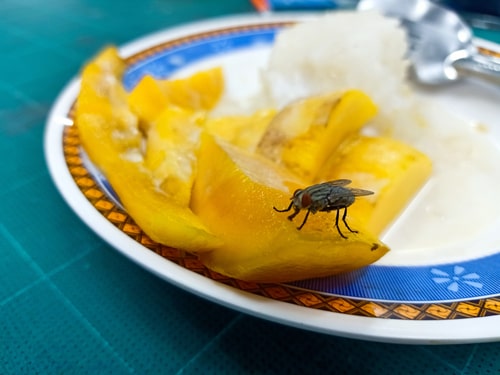This Monsoon, Get Rid of Houseflies Without Reaching Out for Toxic Chemicals
The monsoon brings diseases like malaria and dengue which are spread by flies. These natural hacks will keep your home clean and fly-free.

The increased humidity and moisture makes monsoon the ideal time for houseflies to breed and reproduce. Not just are houseflies irritating as they hover over open food, but they are also carriers of diseases such as typhoid, cholera, dysentery and gastroenteritis. They pick up dirt and bacteria from garbage heaps and transfer these bacteria when they sit on food and other surfaces in our homes.
Most houseflies live for a mere 15 to 25 days, but they have an incredibly fast incubation period. Eggs take eight to 20 hours to hatch and reach maturity in under 3 weeks. It is important to get rid of flies as soon as possible to limit the chances of disease.
However, most commercial pest repellent sprays contain a host of harsh chemicals and strong fragrances that pollute indoor air. To those with sensitive respiratory systems, they can trigger headaches, nausea and asthma. Pest repellents are also best avoided in homes with young children and pets. While you could always arm yourself with a fly swatter, here are a few natural and easy tips to keep your home clean and fly-free.
Keep garbage bins covered
Houseflies love a good, full garbage bin and an open one allows easy access and makes a warm breeding ground. Keep all garbage bins tightly covered during the monsoon, especially wet waste bins. Avoid storing garbage bins in areas where they will be exposed to rain. Flies can also be kept away by emptying wet waste bins often, thus preventing it from attracting moisture, fungus and insects.
Manage compost bins correctly
Houseflies and maggots are attracted to compost bins because of their warmth and humidity. If you have a home compost bin, keep it covered at all times. If it is kept on a balcony, cover it with a raincoat or waterproof plastic sheet. Prevent your compost from getting too soggy by balancing out the moisture levels regularly. This can be done by adding dry leaves or shredded newspaper to the mix to absorb the excess moisture and keep your compost from rotting.
Store food inside
Needless to say, fruit flies love food that is left uncovered, especially fruit. So, don’t leave any meat, ripened fruit, vegetable or food exposed. Store food in the fridge or, if it outside, keep it covered with a lid or cloth.
Plant a herb garden
Many herbs, including mint, rosemary and basil repel flies with their sharp aroma. Flowering plants such as marigold also work as pest repellents. Citronella, a bushy grass much like lemongrass, is great for keeping flies and mosquitoes away.
Make Your own Repellents
Plastic bag filled with water: It’s just a bag filled with water, but you’ll be surprised at how well it works to repel houseflies without using any harsh chemical sprays or artificial fragrances. Fill a transparent plastic bag with water until the halfway mark. Secure the mouth of the bag with a rubber band. Now, tie a piece of string or twine around the rubber band, creating a loop. Using the looped end, hang the bag in your kitchen, bathroom, balcony or any areas of your home that are prone to flies. The bag water-filled bag refracts light, altering its course and velocity. The rays of light, which normally travel in a straight line, bend. Thus confusing the complex optical apparatus of the approaching fly.
Vinegar and dish soap: A mix of dish soap and apple cider vinegar can be a natural fly repellent. Mix about a teaspoon of vinegar with a few drops of dish wash liquid in a bowl or glass. Cover the mouth of the glass with plastic wrap secured with a rubber band. Make a few holes in the plastic sheet. Houseflies, attracted by the solution, will enter the holes, but the dish soap prevents them from settling on the vinegar and they will sink instead.
Plastic bottle trap: Cut the top third of a plastic soft drink bottle. Pour sugar solution or any sweet liquid into the bottom of the bottle. Next, invert the top of the bottle into the bottom section, creating a cone-shaped funnel. Houseflies, drawn by the sweetness, will enter the bottle but will be unable to find their way out.
If you found our stories insightful, informative, or even just enjoyable, we invite you to consider making a voluntary payment to support the work we do at The Better India. Your contribution helps us continue producing quality content that educates, inspires, and drives positive change.
Choose one of the payment options below for your contribution-
By paying for the stories you value, you directly contribute to sustaining our efforts focused on making a difference in the world. Together, let’s ensure that impactful stories continue to be told and shared, enriching lives and communities alike.
Thank you for your support. Here are some frequently asked questions you might find helpful to know why you are contributing?


This story made me
-
97
-
121
-
89
-
167














